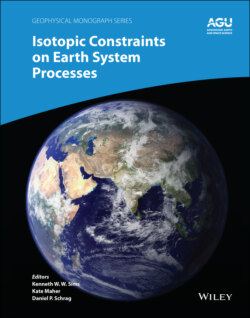Читать книгу Isotopic Constraints on Earth System Processes - Группа авторов - Страница 17
Оглавление
DEDICATION
Education isn’t filling a vessel, it is lighting a fire
—W. B. Yeats
Donald J. DePaolo commenced his scientific pursuits during a period when rapid technological advances in analytical mass spectrometry spawned an era of isotopic exploration and discovery, cementing the field of isotope geochemistry as a cornerstone discipline within the geosciences.
For his Ph.D. thesis at Caltech, under the supervision of Gerald Wasserberg, Don measured neodymium isotopes in volcanic rocks, combining the data with a model of crustal formation to define Earth’s mantle structure. It was simple, powerful, and changed the way we think about the structure of the Earth.
From those early days, it was clear that Don had great potential, but few could have predicted the extraordinary trajectory his career would follow, first at UCLA until 1988, and then at UC Berkeley. Over more than 40 years, Don combined careful and rigorous measurements with even greater scientific intuition to make contributions that span dozens of fields. From the crustal evolution of the Earth to reactive transport in groundwater, Don courageously explored new questions and challenged old orthodoxies. Whether in oceanography, glaciology, petrology, mineralogy, or sedimentology, Don aspired for his students and post‐docs to also think critically and clearly about every aspect of the Earth system.
Those of us who were fortunate enough to study under Don, either at UC Berkeley or UCLA, were keenly aware of Don’s fascination with simple models of the Earth at all scales – from models of the crust and mantle to models of ocean chemistry and biogeochemical cycles, and from sediments and pore waters and their mutual interaction to nucleation and growth kinetics of individual calcite crystals. Don pushed all of us to tackle complicated questions using simple tools and clever measurements, reminding us that there was almost no aspect of Earth science that could not benefit from fresh scrutiny.
In his seventieth year, this monograph honors the contributions Don has made as one of the foremost thinkers in the geological sciences. Don’s eclectic scientific interests have not only inspired future generations of scholars but also promoted a new way of attacking the mysteries of the Earth system. We all call ourselves isotope geochemists – but Don expanded the definition of what that means to touch nearly every corner of Earth science and explore the full range of geologic time. Many of us would hardly recognize each other’s work at conferences, but we all share a common background and a common approach cultivated by Don, which is now being passed on to successive generations.
For all of us students, Don has inspired and transformed our lives. Through Don, we learned to think more critically and to find value in quiet contemplation. His unwavering vision of his own scientific career helped us to define our own paths. His unconcealable enthusiasm for a problem well‐posed taught us that science is both important and fun. But perhaps most importantly, through Don’s belief in each of us, we learned to believe in ourselves. And it is for that gift that we will be forever appreciative.
Kenneth W. W. Sims, Kate Maher, and Daniel P. Schrag
